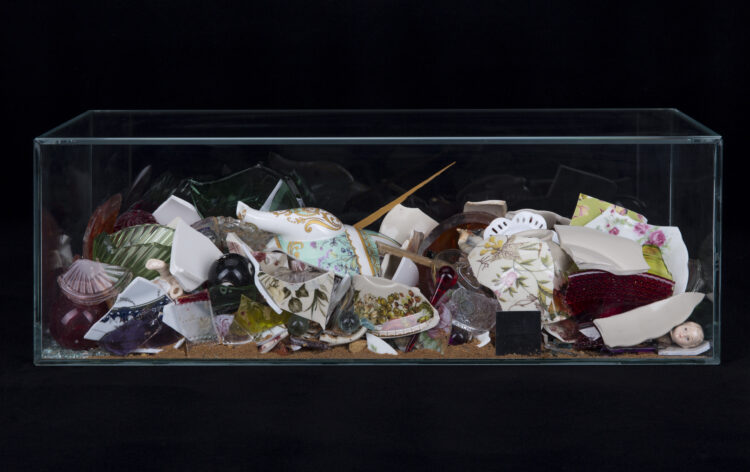Events
Neda Razavipour, Oscillation, mixed media, 2014, collection of the Centre national des arts plastiques, Courtesy of the artist
21, avenue du Maine
75015 Paris
Montparnasse – Bienvenüe metro station, Exit 2, Lines 4, 6, 12 and 13
Villa Vassilieff is accessible to visitors using wheeled devices or who have mobility difficulties thanks to special facilities (access ramp, adapted toilets, and a lift).
In addition, several reserved parking spaces are available close to the Villa Vassilieff:
• in front of 4 rue d’Alençon, 75015 Paris
• in front of 7 rue Antoine Bourdelle, 75015 Paris
• in front of 23 rue de l’Arrivée, 75015 Paris
Consult the map of adapted parking spaces in Paris here.
Chloé Bonnie More and Morad Montazami / Zamân Books & Curating, in collaboration with AWARE, are organizing a discussion dedicated to Iranian women artists with Bahar Majdzadeh, Neda Razavipour and Golnaz Payani on February 17 at the Villa Vassilieff.
All three interdisciplinary artists have always worked between Iran and another place before settling in France or Europe. Their respective practices range from performance to sculpture that belong to a specific context while at the same time never quite belonging anywhere or to any single idea.
Their work summons absence in a dialectic that extends towards universal forms. In the work of Neda Razavipour and Golnaz Payani, the body occupies a central place both formally and theoretically. In the same way, Bahar Majdzadeh’s artistic research is founded on formal and theoretic expressions of memory.
If the three themes of absence, the body, and memory are intrinsically linked by an era open to all scenarios and displacements, during our discussion we will try to highlight their echo and their place in the contemporary art scene.
During the event, films by Iranian artists will be shown and open to the public.
The discussion will be moderated by Chloé Bonnie More and Morad Montazami / Zaman Books & Curating
Practical information
Monday 17 February 2023, from 2:00 to 8:00 pm
Villa Vassilieff
• Shaghayegh Cyrous, Be Yad Ar, 2019, 1 min
• Mitra Farahani, David & Goliath (D&G), 2014, 15 min
• Jaleh Nesari, “Aperture Trilogy”
Fleur Cinema, 1397, 3:42 min
Venus Cinema, 2018, 6:29 min
Home Cinema, 2018, 11:38 min
• Golnaz Payani, Purple landscape, 2019, 15:27 min and Farshad Faroughi, 202x, 7:12 min
• Neda Saeedi, Suturing the Earth, 2014, 7 min
Golnâz Payani was born in Tehran in 1986. After completing a bachelor’s degree in painting from the Faculty of Art and Architecture of Tehran, she pursued her studies at the School of Art in Clermont-Ferrand where she obtained the National Diploma of Visual Arts in 2010 and the National Superior Diploma of Visual Expression in 2013. She has been exhibiting in solo and group shows since 2011, in France (Paris, Clermont-Ferrand, Thiers, Toulouse, Châteauroux, Annemasse, Chanonat, Grenoble) and abroad (Teheran, London, New York, Turin). She has lived in France since 2009 and obtained French nationality in 2017. She’s developed an open practice where various mediums are solicited: film, video, works on fabrics, installation, ceramics, poetry. She is represented by the Praz-Delavallade gallery, Paris/Los Angeles.
Neda Razavipour was born in 1969 in Iran, and lives and works between Iran, Europe, and North America. She studied at the University of Paris I Panthéon-Sorbonne and Stage and Space Design diploma at the National School of Decorative Arts (ENSAD) in Paris. Since 2001, her work has been exhibited around the world. Razavipour co-founded several collectives in Iran covering a range of activities from an experimental theater company to an artists’ collective space and an artist health support network followed by an urban environmental NGO. Neda Razavipour’s practice connects the concepts of daily life with her work. She addresses the challenges inherent in her society and personal life and attempts to change the role of the viewer from ordinary spectator to active participant, using various media. She often tries to reverse the role of spectator and active participant. Without using direct language, she asks questions and encourages the viewer to interact with her work to expand and complete its meaning. She is deeply committed to explore the private and societal lives of women, without being trapped into stereotypes. She is represented by Ab-Anbar Gallery, London/Tehran.
Bahar Majdzadeh is a research artist. Her recent projects marry theory and practice, experimental writing and visual creation; but also cartographic and sound systems. Her research shape the visual work and her writing models thought. Her preferred themes include political and social representation of urban space as well as the collective memory of marginalized social groups and the representation of violence and mourning; she also explores the intersection of art with history and the theory of photography.
Zamân Books & Curating
Dedicated to the study of Arab, African, and Asian modernities, Zamân Books & Curating‘s books and exhibitions aim to provide authentic resources and theoretical tools for a postcolonial history of the visual arts. This in order to play the role of interface between different spheres of knowledge and art theory: academic knowledge, artistic knowledge, vernacular knowledge, digital knowledge…






